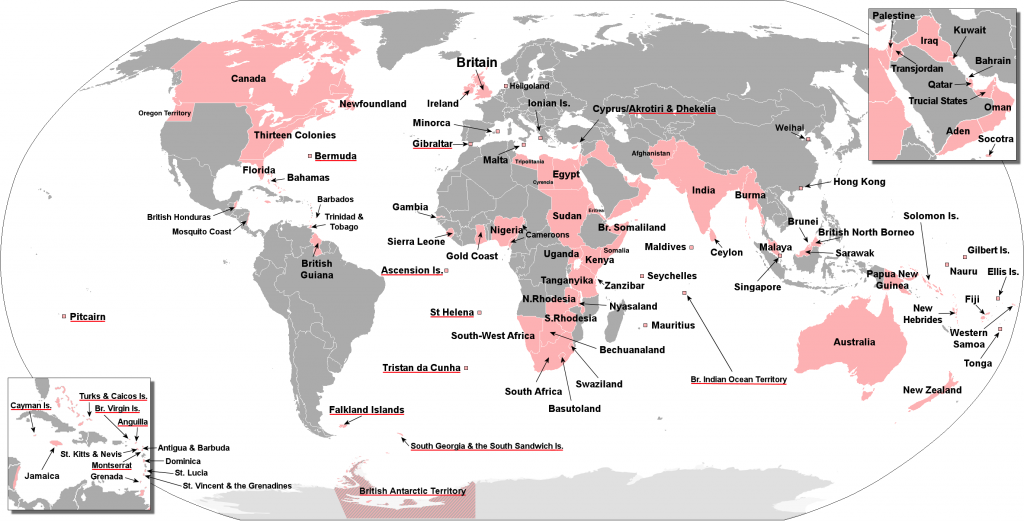
It is barely seventy-two years since a quarter of the human race lived, toiled, danced and finally died under the Union Jack. It is a very short time in terms of the history of the world, but in that time the British view of themselves, and their nation’s place in that world has altered, perhaps more radically than ever before. No other country has experienced a sudden and dramatic convulsion in its own outlook – no, not even terrible wars, occupation, subjection beneath the heel of an aggressive foreign invader, however awesome their effect, can produce a change in national philosophy as total as that undergone by the British since 1939. While Rome took centuries to crumble, the British Empire vanished almost overnight.
Of course it is quite impossible for anyone born since the Fifties to comprehend what it was like to be British and think like a Briton up to the beginning of the Second War. Equally, it is impossible for anyone over eighty today to conceive what it is like today to be young and fit and have no imperial outlook. Generation gaps have always existed; every generation is brainwashed by some medium or other, and brainwashes itself without noticing it.
The child of the Thirties had an imperial view whatever background he came from, lower, middle or upper class. No caste was more imperial in outlook in the 1930s than the British working class. The average British child of the 1930s found being a part of the British Empirerather splendid, because he or she felt they had a status that outdistanced other nations – including much larger ones – and it is hardly possible to imagine a centre of Empire smaller than the British Isles.
All that child needed was a brief look at the map of the world, where one fifth of it was coloured pink. The child of 2012 has no such conceit, no such evidence, and does not care because who needs it? Besides, the child of the twenty-first century has been brought up by his parents and teachers, films, radio and television to know that imperialism was not at all respectable to use a euphemism, and positively evil to speak clearly.
Imperialism was the policy of extending a country’s influence over other, less powerful states. There have always been empires until now. Greece, Rome, the Ottomans, Spain, France, Russia and Britain have extended their power over societies at different times, and the best way to do it was to call it an empire and rule it by might tempered with intelligence. The effects of imperialism were to a certain extent beneficial to indigenous populations whatever self-righteous liberals say, but it too often led to a breakdown in traditional forms of life, a disruption of native civilization and the forceful imposition of different religious beliefs.
The British Empire in 1923, only ninety-nine years ago, was primarily a result of commercial and political motives. It was not there to bully, though it contained bullies. At its zenith, in the late 19th and early 20th centuries, it comprised one quarter of the planet’s area and population. Eminence had been established over the Dutch, French, Portuguese, Spanish and Belgian rivals by command of the seas thanks to the British Navy and its discipline, sailing ability, navigational instruments, charts and sheer doggedness.
In human and economic terms, two ruinous world wars and nationalistic agitation against economic disparities forced Britain to shed its colonies one by one, sometimes faster, from the end of the Second War. In some cases such as India, clean independence was botched by inefficient rule from London and a hopelessly ambitious and selfish Viceroy. Some dependencies or protectorates chose easily achieved independence, while others thought it necessary to employ violent methods, such as certain countries on the African continent, and Ireland. But the final result is the same. The modern child, Blackberry in hand, his mind occupied by friendly fire in the form of messages, not only has no conception of what the British Empire was; nor does he care, because Now is more important than Then.
Having said this, it is necessary to remember one enormously important result of empire: when both World Wars of the awful twentieth century broke out, it was the Commonwealth – that odd relic of empire – which came to Britain’s aid. Without Canadian, Australian,New Zealand, South African or Rhodesian forces Hitler’s war would have been victorious in a matter of days. Even the most significant of all Britain’s ex-colonies,America, decided (if rather late) to come to Britain’s aid. The modern child, possessed of painfully little education in History, must wonder what might have happened had those original thirteen colonies not existed, and one fifth of the world had not been coloured pink.









Leave A Comment